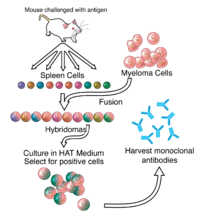
Photo from wikipedia
This chapter summarizes the most common chromatographic mAb and mAb fragment purification methods, starting by elucidating the relevant properties of the compounds and introducing the various chromatography modes that are… Click to show full abstract
This chapter summarizes the most common chromatographic mAb and mAb fragment purification methods, starting by elucidating the relevant properties of the compounds and introducing the various chromatography modes that are available and useful for this application. A focus is put on the capture step affinity and ion-exchange chromatography. Aspects of scalability play an important role in judging the suitability of the methods. The chapter introduces also analytical chromatographic methods that can be utilized for quantification and purity control of the product. In the case of mAbs, for most purposes the purity obtained using an affinity capture step is sufficient. Polishing steps are required if material of particularly high purity needs to be generated. For mAb fragments, affinity chromatography is not yet fully established, and the capture step potentially may not provide material of high purity. Therefore, the available polishing techniques are touched upon briefly. In the case of mAb isoform and bispecific antibody purification, countercurrent chromatography techniques have proven to be very useful and a part of this chapter has been dedicated to them, paying tribute to the rising interest in these antibody formats in research and industry.
Journal Title: Methods in molecular biology
Year Published: 2019
Link to full text (if available)
Share on Social Media: Sign Up to like & get
recommendations!